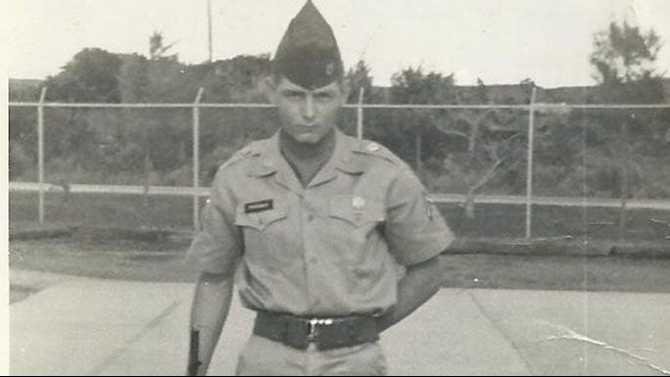Porterdale native Phillip ‘Flip' Freeman milked many a cow on his family's dairy farm on Brown Bridge Road. "I love to farm," Freeman said. "It's hard work, but it's honest work."
His father and three uncles served in World War II. "My dad lost part of his foot during the war," Freeman said. "But it never slowed him down." Freeman reinforced the family's military tradition in 1962. "I dropped out of Newton County High School in my junior year to join the Army," he recalled. "I earned my GED in the military."
Sent to Fort Jackson, S.C. for basic training, the Army speculated Freeman's milk-hauling experiences would make him a good candidate for transportation. "Nope," he said. "That lasted two weeks. The Army couldn't teach me anything new about trucks so they put me in communications."
Assigned to Okinawa in May of '63, by September Freeman was en route to the DMZ separating North and South Korea. "By then, I was with Headquarters Company, 1st Brigade, 57th field artillery," he said. "The North Koreans were rattling sabers again so we sort of hunkered down until they ran out of hot air." Returning to Okinawa, Freeman received additional training that served him well for the remainder on his military enlistment. "I was assigned to the motor pool, learned heavy equipment maintenance, engine rebuild, things of that nature." In the interim, the Army was in transition to Mobile Warfare - the Air Calvary - and they needed their best. Freeman was sent to Fort Ord, Calif. "I rode with pilots to learn about the Huey, LOH 6s (Light Observation Helicopter) and Chinooks," he said. "To tell ya the truth, we stayed in the coffee shop most of the time."
With less than a year remaining on his enlistment, Freeman volunteered for a war called Vietnam. "I had a buddy in personnel," he said. "He knew about a senior vehicle mechanic's slot in Nam. I took it, that way my little brother didn't have to go."
In early 1966, the war in Vietnam was in the initial stages of a major escalation. "I was part of the 4th Infantry Division stationed near Tuy Hoa, a coastal town on the South China Sea," Freeman said. "The area was gorgeous, except for the war."
And the war came quickly. Within days, Freeman experienced his first rocket and mortar attack. "All hell broke loose," he said. "I jumped into a foxhole but kept in mind what I'd been told, ‘get out if you feel something slimy, it's probably a bamboo viper or cobra.' We could hear the Viet Cong screaming and hollering as they sloshed across a nearby river. They opened up; then we opened up with everything we had. Then things got real quiet."
‘Real quiet' meant the enemy attack had been broken, at least on that night. "We found blood trials all over the place, but no bodies. That was a norm - blood trails and no bodies."
Freeman's numerous talents were put to good use repairing heavy equipment and rebuilding motors. During the day, he retrieved damaged vehicles with a massive wrecker and at night used the wrecker's huge lights to illuminate the helipad. He fueled choppers and tied down rotor blades, reconstructed and refurbished ¾ ton and five-ton trucks, pulled guard duty on moonlit beaches, manned .50 caliber or M-60 machine guns during night attacks, but never got used to the screaming and hollering and blood trails and no bodies.
One regular assignment still haunts his memory. "I used the wrecker to retrieve damaged trucks or personnel carriers. I was 21 years old retrieving damaged equipment littered with the body parts of 17 and 18-year-old kids. I refused to touch the vehicles when we got back to base; that job belonged to graves registration. I try not to remember things like that, but you do and you just have to live with it."
The wrecker was armed with a .50 caliber machine gun on a swivel mount top turret. Freeman recalled, "We'd be on a recovery mission in the middle of a rice paddy, nothing but water for hundreds of yards, then all of a sudden, ‘ping, ping, ping' against the side of the wrecker. My gunner would open up with the .50 cal, and it's faster than a termite chewin' through a fence post, but he never knew in which direction to aim. Nam was about survival, that's about it."
Temporary assignments took Freeman to larger facilities like Na Trang and Cam Ranh Bay, but his out-processing at Pleiku allowed him to recall better things. "The red hills, pine trees and crimson mud around Pleiku jogged my memory of Georgia. Shoot, all I needed was cornbread, crackers, and butter beans and I'd felt right at home."
Freeman worked short stints at Taber Pontiac, Mobil Chemical and Mitchell Auto Parts before retiring after a long career as an over-the-road driver. "I had that itch to get out, to move on and not be tied-down," he said. "You know, one day at the drag races in Commerce, two Army sergeants saw my Vietnam veteran hat and both thanked me for my service. I thanked them for their service too. I guess the good Lord understands that we veterans need to stick together."
Pete Mecca is a Vietnam veteran, freelance writer and columnist. You can contact him at aveteransstory@gmail.com.




